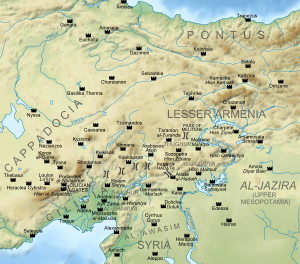Siege of Kamacha (766)
| Siege of Kamacha | |||||||
|---|---|---|---|---|---|---|---|
| Part of the Arab–Byzantine Wars | |||||||
 The Arab–Byzantine frontier zone along the eastern fringes of Asia Minor |
|||||||
|
|||||||
| Belligerents | |||||||
| Abbasid Caliphate | Byzantine Empire | ||||||
| Commanders and leaders | |||||||
|
al-Abbas ibn Muhammad al-Hasan ibn Qahtaba |
Unknown | ||||||
The siege of Kamacha by the Abbasid Caliphate took place in autumn 766, and involved the siege of the strategically important Byzantine fortress of Kamacha on the eastern bank of the Euphrates river, as well as a large-scale raid across eastern Cappadocia by a part of the Abbasid invasion army. Both enterprises failed, with the siege dragging on into winter before being abandoned and the raiding force being surrounded and heavily defeated by the Byzantines. The campaign was one of the first large-scale Abbasid operations against Byzantium, and is one of the few campaigns of the Arab–Byzantine wars for which detailed information survives, although it is barely mentioned in Arabic or in Byzantine sources.
Following the Umayyad civil wars of the 740s and the turmoil of the Abbasid Revolution, the Byzantines under Emperor Constantine V (reigned 741–775) regained the initiative in their eastern border and pursued an aggressive, but limited, strategy towards the Caliphate: rather than attempting a reconquest, through his deportation of frontier populations and his obstruction of Muslim fortification efforts, Constantine pursued the establishment of a permanent no-man's land between Byzantine and Muslim domains that would shield Asia Minor and obstruct Muslim raids against it. Among the fortresses captured by the Byzantines, in 754/755, was Kamacha (in Arabic: Hisn Kamkh). Strategically located on a plateau above the banks of the Upper Euphrates, it lay on the easternmost extremities of Byzantine territory, and since its first capture by the Arabs in 679 it had changed hands many times.
...
Wikipedia
